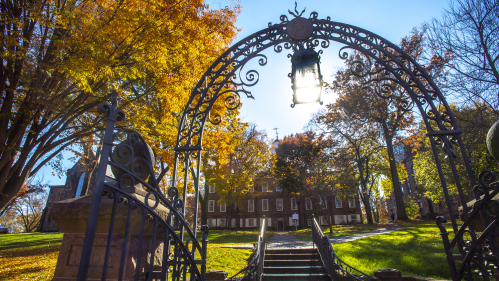Rutgers–New Brunswick Charts Course With New Academic Master Plan

Rutgers University–New Brunswick this week released its Academic Master Plan, a strategic push toward further academic excellence and heightened focus on student success for Rutgers’ largest campus.
The Rutgers–New Brunswick Academic Master Plan, created with involvement from students, faculty and staff across campus, serves as a roadmap for Rutgers–New Brunswick’s future and aims to:
- Prioritize success of students
- Provide a rigorous academic experience
- Solve the most complex challenges of our day with a renewed commitment to interdisciplinary research
- Lead in public service and social justice
Rutgers University President Jonathan Holloway described the Rutgers–New Brunswick Academic Master Plan as a significant achievement that will aid in solidifying Rutgers’ place among the best public universities in the country.
“This Academic Master Plan for Rutgers–New Brunswick sets forth a clear set of goals and objectives that prioritize academic excellence, fulfills our three-part land-grant mission and prepares citizens who are civic-minded, intellectually curious, creative and resourceful,” Holloway said. “I commend Dr. Conway and the Academic Master Plan Steering Committee for developing this plan with intensive involvement from the Rutgers–New Brunswick community.”
Described as a living document, the plan aims to support initiatives in support of the university’s ambition as a national leader among institutions of higher education that exemplify excellence in inclusive research, teaching and service toward the common good.
Rutgers–New Brunswick Chancellor-Provost Francine Conway said, “The Academic Master Plan process included significant input from students, faculty and staff, as well as intensive research into the many strengths and opportunities that exist across Rutgers–New Brunswick’s schools, institutes and operational units. I am confident that it will guide our community toward its full potential as a world-recognized leader in education, research and public service that prepares our students for success and makes a significant impact for our communities, the state of New Jersey and the world.”
The plan’s primary objective is to cultivate excellence at Rutgers–New Brunswick. To this end, the Academic Master Plan is focused on four pillars of excellence:
Scholarly Leadership: Elevate the scholarly leadership of intellectual communities that support the diverse populations within Rutgers, New Jersey, the nation and the world.
Innovative Research: Strengthen Rutgers–New Brunswick’s capacity to solve grand challenges in our community, state, country and the world to reflect our commitment to the public good.
Student Success: Transform the student experience.
Community Engagement: Build on Rutgers–New Brunswick’s strong foundation of community engagement.
Earlier this week, members of the community reviewed the Academic Master Plan during a virtual town hall. Conway and members of the steering committee outlined the plan as well as its goals, objectives and implementation efforts.
Creation of the Academic Master Plan was a nine-month, inclusive effort led by a steering committee of more than 70 faculty and staff members. The feedback process involved more than 1,000 town-hall attendees, survey responses from 1,500-plus faculty and staff members and more than 2,400 students and numerous meetings with various stakeholders, including undergraduate and graduate students, faculty, staff and administrators.
Each pillar includes a set of goals and objectives. For example, the pillar of student success calls for transforming the student experience for all students—including transfer students, returning professionals and others—including focusing on their well-being; ability to navigate Rutgers; preparedness to work and learn in diverse and cross-disciplinary settings; and readiness to contribute to the greater public good.
Implementation of the plan during the coming months will utilize a three-part structure: the development and implementation of new and existing projects that will support the plan’s objectives; a Chancellor-Provost’s Challenge for transformational campus-wide initiatives; and administrative-level initiatives.


